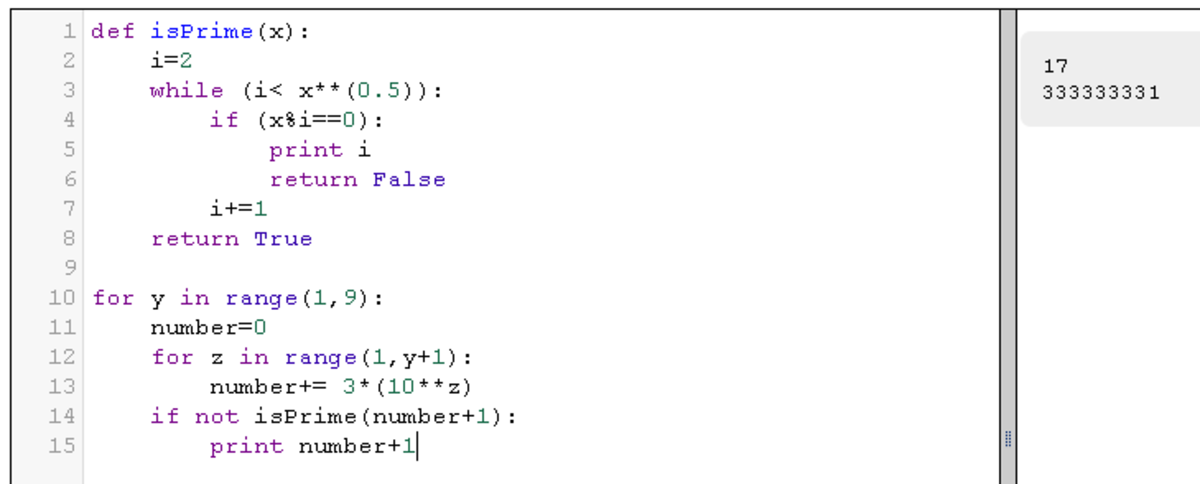Weird Ones
3 1 3 3 1 3 3 3 1 3 3 3 3 1 3 3 3 3 3 1 3 3 3 3 3 3 1 3 3 3 3 3 3 3 1 3 3 3 3 3 3 3 3 1
Which one of these numbers is not like the others?
This section requires Javascript.
You are seeing this because something didn't load right. We suggest you, (a) try
refreshing the page, (b) enabling javascript if it is disabled on your browser and,
finally, (c)
loading the
non-javascript version of this page
. We're sorry about the hassle.
5 solutions
Challenge student note: Nice observation. Keep posting such beautiful problems.
The next prime of this form has 1 7 three's followed by a 1 . :P
How about if we put other digits in place of 3 ?
Log in to reply
Prove that there's infinite number of primes of this form!
Log in to reply
Perhaps a good starting point is to observe that these numbers are of the form 3 1 0 n − 7 for integers n > 1 .
I didnt test all of them for primes and guessed that 31 is the only prime among them and marked 31 as the answer. And when i saw the solution i blamed my laziness.
Log in to reply
I did the same thing
I did just the opposite. I guessed the last number because I looked at the number of 3's and the factors of the number of 3's. All factors were prime except the last one. Basically I factored out the total number of 3's in each number and all the factors were prime numbers, except the last one that had 4 (as 8=4x2).
Excuse me for saying this but how the hell on the earth are we supposed to factorize all those numbers?! and by the way this question is nothing even close to logic the way you solved it.
Log in to reply
It's very difficult to factor them. But you can easily show that the first 3 numbers are prime. Then you could make the assumption that all are primes, testing out the primality of the rest of the numbers for potential small prime factors show that 17 is a factor of the last number. I posted this question in logic because it's an old gem in recreational mathematics and there isn't one right answers to sequences like these. That's why I posted this in Logic rather than in other topics whereby you need rigorous proof for everything.
Log in to reply
@Pi Han Goh Thank you sir.And BTW since that assumption can be a little hard to make (primality) don't you think the problem is slightly underrated?
Log in to reply
@Arian Tashakkor – Hahaha, possibly. But I don't think sequences-related problems deserve a high rating in the first place.
I answered 31... because 31 is not like the other numbers which are preceded by 3. :-)
hi,just think of this solution......all the numbers ......when their digits are added (only 3 )every number gives some value at the units place of the result,but 7 3's number gives 21 giving 1 in units place .that matches with the left out 1... of every number.
Another "weird one" solution of mine. I'm not really good at math so this is how I did:
- 3+1=4
- 3+3+1=7
- 3+3+3+1=10
- 3+3+3+3+1=13
- 3+3+3+3+3+1=16
- 3+3+3+3+3+3+1=19
- 3+3+3+3+3+3+3+1=22
- 3+3+3+3+3+3+3+3+1=25
Of course there would be odd numbers and even numbers alternatively. I separated all the numbers into 2 groups: even and odd. Nothing's strange in the group of even number, all of them are not prime. However, in the group of odd number only the last one is NOT prime. That's why I chose 333333331.
Actually I myself feel that this is not a good answer tho. Anyway (luckily) it helps me picking the right one.
can u tell me how to guess which one is not prime speedily?
Read my first reply to Arian Tashakkor.
All of these numbers are prime except 333333331. 333333331/17=19607843
 Only one number was not prime, i.e. composite.
Only one number was not prime, i.e. composite.
Moderator note:
But how does that prove that is the odd one out ?
All of these numbers are prime except the last one. 3 3 3 3 3 3 3 3 1 = 1 7 × 1 9 6 0 7 8 4 3 .